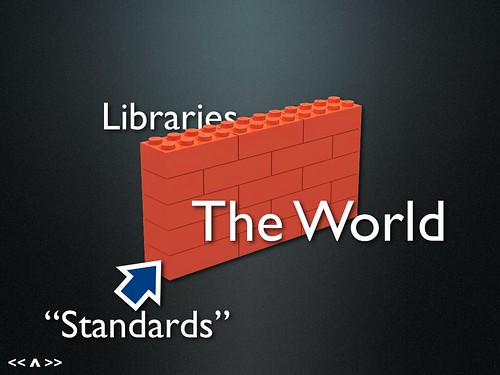As with all my other presentations, the my slides tell less than half the story, but I’ve posted them anyway. I’m told the audio was recorded, and there’s a chance that will help explain all this, but until then you’ll have to piece this all together from my previous writings, what little I’m about to offer here, and the slides (which, again, without the spoken component, probably do more to misdirect interested readers than answer questions).
My code4lib 2006 presentation included discussion not only of (WPopac, my open source OPAC based on WordPress, but also a plea for us within the libraries to look outside our community for practices and standards that are in use and supported by larger populations than we can ever hope for on our own. WPopac is one attempt at that, using an application that can already claim “hundreds of thousands” of current users and many thousands of developers. Amazon offers another example, boasting 140,000 registered developers of its API, making it the defacto standard for the exchange of bibliographic information online. Meanwhile, our community of programmers within libraries, which is far smaller than 1% of Amazon’s registered API users, must contend with dozens of metadata standards (MARC, MODS, METS, DC, etc., etc., etc.) and communication interfaces (SRU/SRW, z39.50, and more) to do substantially similar work.
I’ve talked about this before (here, here, here, and here, among others), and I’ll be talking about it more yet. Most exciting for me, I wasn’t alone in my plea, as Art Rhyno made some great points about how our acquisitions and accounting processes are substantially similar to what’s called ERP in the outside world.
